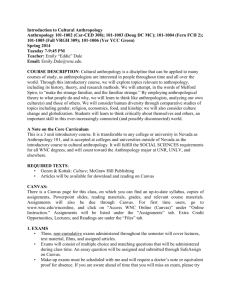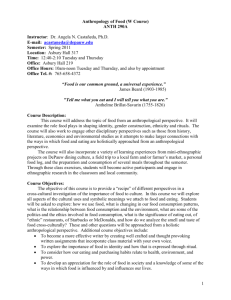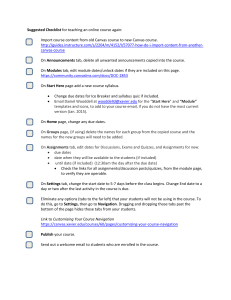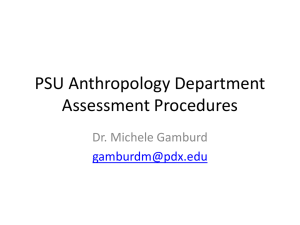ANTH 101 1006: Introduction to Cultural Anthropology
advertisement
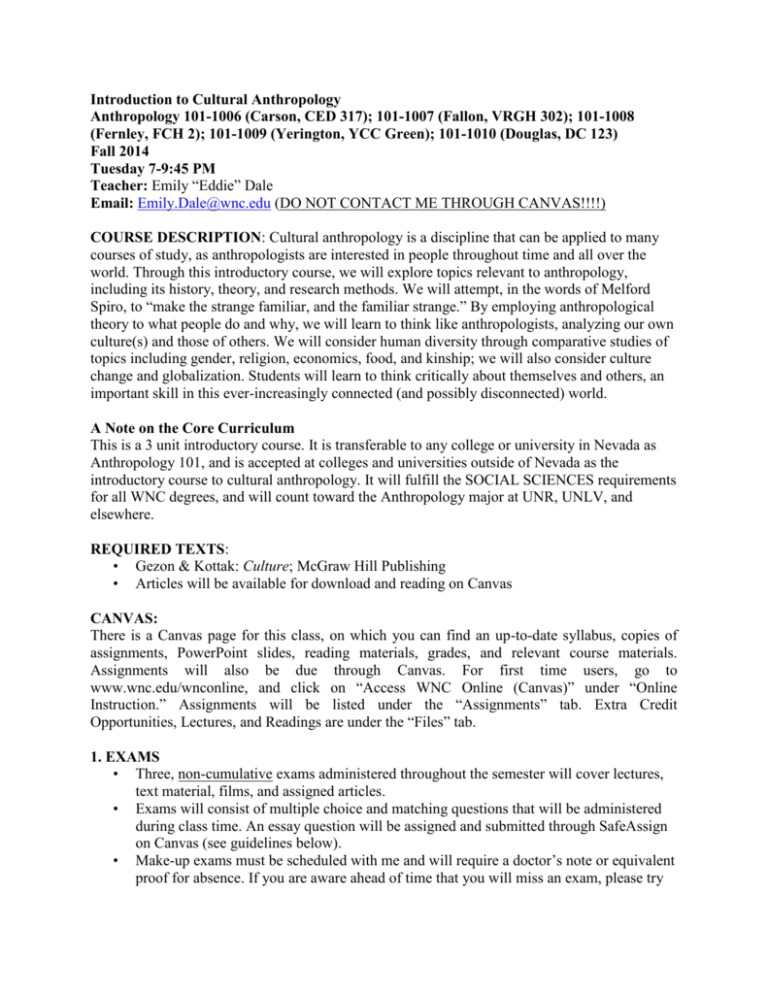
Introduction to Cultural Anthropology Anthropology 101-1006 (Carson, CED 317); 101-1007 (Fallon, VRGH 302); 101-1008 (Fernley, FCH 2); 101-1009 (Yerington, YCC Green); 101-1010 (Douglas, DC 123) Fall 2014 Tuesday 7-9:45 PM Teacher: Emily “Eddie” Dale Email: Emily.Dale@wnc.edu (DO NOT CONTACT ME THROUGH CANVAS!!!!) COURSE DESCRIPTION: Cultural anthropology is a discipline that can be applied to many courses of study, as anthropologists are interested in people throughout time and all over the world. Through this introductory course, we will explore topics relevant to anthropology, including its history, theory, and research methods. We will attempt, in the words of Melford Spiro, to “make the strange familiar, and the familiar strange.” By employing anthropological theory to what people do and why, we will learn to think like anthropologists, analyzing our own culture(s) and those of others. We will consider human diversity through comparative studies of topics including gender, religion, economics, food, and kinship; we will also consider culture change and globalization. Students will learn to think critically about themselves and others, an important skill in this ever-increasingly connected (and possibly disconnected) world. A Note on the Core Curriculum This is a 3 unit introductory course. It is transferable to any college or university in Nevada as Anthropology 101, and is accepted at colleges and universities outside of Nevada as the introductory course to cultural anthropology. It will fulfill the SOCIAL SCIENCES requirements for all WNC degrees, and will count toward the Anthropology major at UNR, UNLV, and elsewhere. REQUIRED TEXTS: • Gezon & Kottak: Culture; McGraw Hill Publishing • Articles will be available for download and reading on Canvas CANVAS: There is a Canvas page for this class, on which you can find an up-to-date syllabus, copies of assignments, PowerPoint slides, reading materials, grades, and relevant course materials. Assignments will also be due through Canvas. For first time users, go to www.wnc.edu/wnconline, and click on “Access WNC Online (Canvas)” under “Online Instruction.” Assignments will be listed under the “Assignments” tab. Extra Credit Opportunities, Lectures, and Readings are under the “Files” tab. 1. EXAMS • Three, non-cumulative exams administered throughout the semester will cover lectures, text material, films, and assigned articles. • Exams will consist of multiple choice and matching questions that will be administered during class time. An essay question will be assigned and submitted through SafeAssign on Canvas (see guidelines below). • Make-up exams must be scheduled with me and will require a doctor’s note or equivalent proof for absence. If you are aware ahead of time that you will miss an exam, please try • to schedule a make up with me at least a week in advance of the scheduled test. Points: Each exam is worth 50 points 2. WRITING • In lieu of a formal research paper, your writing requirement for the class will be fulfilled through a series of five critical thinking and response assignments, due throughout the semester, as shown on the schedule below. These assignments will test your understanding of certain concepts and require you to apply them to your everyday life. • The assignments will be posted to Canvas and will be submitted in digital format (Safe Assign) to Canvas. They are due at 11:59 pm on the night listed on the schedule below. • Points: Each writing assignment is worth 10 points 3. ATTENDANCE AND PARTICIPATION • Do the readings prior to class so that you can contribute to the discussions. (They will also show up on the tests, hint hint). • Attendance and participation are a factor in this grade and will be calculated based off daily roll call. Excused absences and documented emergencies do NOT count toward a missed class. Please inform me if you will miss or have missed a class where attendance was taken and you missed for a legitimate reason (family death, illness, etc… (sleeping in past your alarm does not count). Documentation is required.). • Points: Participation and attendance are worth 15 points Extra credit will be offered during the semester, but will be limited to 10 points per student in total. Extra credit opportunities, mostly in the form of attending lectures, reading extra articles, or watching additional films and writing a 1-2 page summary and reflection of what you learned, will be announced in class (see expectations and instructions below). Each submission is worth up to 3 points. Extra credit articles will also be posted to this section of Canvas, as will links to films available on-line. Extra credit is to be turned into me in class or e-mailed to me within two weeks of the extra credit being assigned. No extra credit will be accepted after April 30. LATE ASSIGNMENTS • Late assignments will not be accepted. POINT BREAKDOWN: Exams (3) 150 Assignments (5) 50 Participation 15 Total possible 215 For all graded assignments: 94-100 = A; 90-93 = A-; 87-89 = B+; 84-86 = B; 80-83 = B-; 77-79 = C+; 74-76 = C; 70-73 = C-; 67-69 = D+; 64-66 = D; 60-63 = D-; 0-59 = F For those who fall in between two of these grade categories, people with .5 or higher will receive the higher grade, while those with .4 or lower will receive the lower grade. For example, a grade of 93.52 will be bumped up to an A for the class, while a grade of 93.46 will stay an A-. ACADEMIC DISHONESTY POLICY Students are expected to adhere to the ethical code as described in the WNC Student Handbook. This code specifies that with enrollment, an individual commits to the principles embodied in the code. Academic dishonesty (cheating, plagiarism, etc.), in any form is unacceptable. Any student engaging in academic dishonesty in this course will receive a 0 on the exam/assignment in question, and the case will be reported to the proper university authorities. ACADEMIC DISABILITY: WNC supports providing equal access for students with disabilities. Susan Trist (DSS coordinator) is available to discuss appropriate academic accommodations that students may require. Please contact Susan (774-445-3268) at your earliest convenience. ACADEMIC SUCCESS SERVICES Your student fees cover usage of the WNC Academic Skills Center, which offers tutoring, both walk-in and by appointment, computer use, and workshops. For more information, visit www.wnc.edu/studentservices/asc or in person on the Carson City Campus in Bristlecone Building, room 330. PLEASE TURN OFF CELL PHONES & OTHER ELECTRONIC DEVICES DURING CLASS AND NO TALKING. THESE ARE ALL DISRUPTIVE AND INCONSIDERATE TO YOUR FELLOW CLASSMATES. SCHEDULE: The following class schedule is subject to change. All readings should be completed before the class for which they are assigned. Under readings, TB=Textbook Chapter and CA=Canvas Article. Date Topic Sept 2 Syllabus Overview and Introduction to Anthropology Film: NO CLASS Sept 9 Culture Sept 16 Doing Anthropology Film: The Language You Cry In Sept 23 Language and Communication Film: The Linguists Aug 26 Sept 30 Making a Living Readings Assignments Extra Credit TB: Chapter 1 None None NO CLASS TB: Chapter 2 CA: Body Ritual among the Nacirema TB: Chapter 3 CA: Eating Christmas in the Kalahari TB: Chapter 4 CA: How Language Shapes Thought and Rapport-talk and Report-talk NO CLASS Updated Nacirema, Due Sept 13 Methods Practice, Due Sept 20 NO CLASS Film: Merchants of Cool Article: Shakespeare in the Bush None None TB: Chapter 5 CA: The Inuit Paradox Food Journal, Due Oct 4 None Date Topic Oct 7 EXAM ONE Social Stratification & Political Systems Oct 14 Oct 21 Oct 28 Ethnicity and Race Film: Race: The Power of an Illusion Families, Kinship, and Marriage Film: The Women’s Kingdom EXAM TWO Gender Nov 4 Religion Film: Maasai: A Warrior’s Rite of Passage Nov 11 VETERAN’S DAY Nov 18 Art and Culture Nov 25 Colonialism and Globalization Film: T-Shirt Travels Dec 2 Applying Anthropology Film: Milking the Rhino Dec 11 FINAL EXAM Readings EXAM ONE TB: Chapter 11 CA: Cell Phones […] in an African Society TB: Chapter 11 CA: Can White Men Jump? Assignments Extra Credit EXAM ONE Article: The None Kpelle Moot None None TB: Chapter 7 CA: Arranging a Marriage in India Kinship Activity, Due Oct 21 (inclass) Article: Death without Weeping EXAM TWO TB: Chapter 8 CA: The Berdache Tradition EXAM TWO None Film: Taboo: The Third Sex TB: Chapter 9 CA: Baseball Magic VETERAN’S DAY CA: Where Fat is a Mark of Beauty TB: Skim Chapter 10, Read Chapter 13 CA: The Price of Progress TB: Chapter 12 CA: The Americanization of Mental Illness FINAL EXAM NO CLASS Article: The Notion of Witchcraft Explains Unfortunate Events NO CLASS None None Your Globalized Self; Due Nov 29 None None None FINAL EXAM None EXTRA CREDIT GUIDELINES: Over the course of the semester, you can earn up to ten (10) extra credit points by watching films, reading extra articles, or other activities I announce in class. Each individual assignment is worth up to 3 points. Each assignment should be 1½ to 2 pages long and should contain two parts. The first part should summarize the piece of extra credit. What was the lecture/film/article about? What were the key points? What did you learn? The second part should tie the lecture/film/article to class? Why did I have you read or watch this? What terms from class does it tie in with? Don’t forget to define those terms. This section should demonstrate that you understand the material and how it ties back into what you’ve learned (and it will also help you study for the tests!). The point system, therefore, works thusly: 1 point: you turned something in that is vaguely related to the assignment (if it’s really bad, I will give you a zero) 2 points: you’re close, but you’re missing a key element of the assignment 3 points: you clearly understood the material and how it relates to class You can turn in as many assignments as is necessary until you get the 10 points (see below for a detailed description of when they are due, etc…). Turn these into me in class! The on-line portion of the class has a tab labeled “Extra Credit Opportunities” where I will document and record all the opportunities for you to receive extra credit. I will also announce them in class and some are listed on your syllabus. Readings: Due within two weeks after the class for which they’re listed!! You can do as many extra readings as you want until you reach 10 points. These readings are listed on your syllabus as “EC Readings” under specific days. This should make it easy to tie them to class. Films: Due within two weeks after the class for which they’re listed!! You can watch as many extra films as you want until you reach 10 points. These films are listed on your syllabus as “EC Films” under specific days. This should make it easy to tie them to class. Have a film party with your classmates. Eat popcorn. Impress your friends with your classy college activity. Personal Experience: You can do one of these for extra credit. It is due before the end of the semester by April 30. Do you play a sport? Act in plays? Did you spend your vacation doing something fun? What sort of extra-curricular activities do you participate in? In the same format as the other extra credit assignments, pick something you do or have done and summarize your activity or experience, and then tie it to class and a specific topic we discussed. How does anthropology tie in with your everyday life? EXAM ESSAY QUESTION GUIDELINES Answer the question providing as much relevant information as you can. Be as specific as possible. An appropriate length for the answer is at least 1-1½ pages long, but of course you may write as much as you like. The goal is to answer the question as fully as possible. REMEMBER: This essay is open-book/open-note, so be sure to take your time and craft a well-thought out and well-constructed response. Also be sure to USE YOUR OWN WORDS whenever possible (i.e., do not copy directly from your book, the internet, etc…). If you do wish to use direct quotes, give the authors credit by citing your sources. Take this opportunity to show off how much you know!!! 1) Basics: Your essay should be Times New Roman, 12-point font, double-spaced, with 1-inch margins. I spend enough time writing documents to be able to tell when you’ve tweaked the margins. Don’t try to trick me. I can download your assignments and check. Failure to follow these guidelines will result in a loss of 1 point. 2) Grammar: As you have time and spell/grammar check, I expect low amounts of errors. While I will not deduct points for a few errors, a large amount of errors will result in a loss of 1 point. 3) Format: This is an essay test. Treat it as one. This means your answer should contain an introduction, body, and conclusion paragraphs. It should also be written in full sentences (no bullet points). Failure to do this will result in a loss of 1 point. 4) Citations: As this is an open-note, open-book essay, I expect you to use your textbook and assigned articles. Additionally, you should get the names and authors correct (they are all listed on the syllabus). If you mention these sources, you should cite them, especially if you quote them. This includes both in-text citations and end-of-the essay citations. For the films, mentioning the title is sufficient. Failure to use these sources will result in a loss of 1 point. Failure to cite them properly will also result in a loss of 1 point. In order to be helpful, here are the citations: Textbook: Gezon, Lisa and Conrad Kottak. Culture. New York: McGraw Hill Publishing, 2012 Rapport-talk and Report talk: Tannen, Deborah. "Rapport-talk and Report talk." Classical Readings in Cultural Anthropology. New York: Wadsworth Cengage, 2009. 11-15. Other Articles: AUTHOR HERE. "TITLE HERE." Annual Editions: Anthropology 12/13 (Annual Editions: Anthropology). New York: McGraw-Hill/Dushkin, 2012. PAGES HERE. 5) Plagiarism: PLAGIARISM IS NOT ACCEPTABLE! IT WILL RESULT IN A DEFINITE ZERO (0) FOR THE ESSAY (WHICH ACCOUNTS FOR ABOUT 20% OF THE TEST SCORE) AND A POSSIBLE ZERO (0) FOR THE ENTIRE TEST! TURNITIN WILL CATCH YOU! THERE IS NO REASON FOR YOU TO CHEAT! THIS ESSAY IS OPENNOTE AND OPEN-BOOK. NOT CITING SOURCES DOES COUNT AS PLAGIARISM. REMEMBER, CITING MAKES YOU LOOK SMART! Please complete this form, tear off the page, and turn it in to me by the end of class. This is the first attendance sign-in. It is brief survey; it is kept confidential. I will use it to create a class roster and to help me to assist students and accommodate their interests wherever possible. Tell me about yourself… Name: ________________________________________________________________________ Preferred nickname:____________________________________________________________ Year in school: _____________________________ Academic major (minors):________________________________________________________ Have you taken any anthropology or related classes, perhaps in the social sciences? List them: ______________________________________________________________________________ ______________________________________________________________________________ ______________________________________________________________________________ ______________________________________________________________________________ ______________________________________________________________________________ ______________________________________________________________________________ Why did you decide to take this class? (Please be honest!) ______________________________________________________________________________ ______________________________________________________________________________ ______________________________________________________________________________ ______________________________________________________________________________ ______________________________________________________________________________ What topics in anthropology interest you in particular? Any from the syllabus or book? ______________________________________________________________________________ ______________________________________________________________________________ ______________________________________________________________________________ ______________________________________________________________________________ ______________________________________________________________________________ Do you have any concerns or questions about the class? ______________________________________________________________________________ ______________________________________________________________________________ ______________________________________________________________________________ ______________________________________________________________________________ ______________________________________________________________________________
